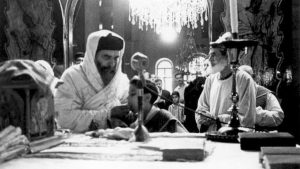I boarded the plane. As I settled into my customary aisle seat, my eye caught an empty row of three up ahead. It was a clear day. Lima to Sao Paulo. Across the Andes, for goodness sake. Five hours. What about a window seat? Yes, why not?! So I settled into my new digs, with imaginary toothpicks holding up my eyelids so that I can remain alert until after take-off.
In the end sleep was the least of all likelihoods…
Julia Cameron’s John Stott’s Right Hand (Piquant, 2014), ‘the untold story of Frances Whitehead’, was the book of choice for this flight. The story of the woman who worked alongside John Stott for 55 years – in ‘a unique partnership … for which the English language perhaps has no word’ (86). One can only imagine how a Hollywood scriptwriter would mess with the characters and the plot. And yet Frances occupies so much of ‘the back-story to John Stott’s colossal influence’ (189).
The book was finished on this single flight despite frequent interruptions to savour the view outside my window.
The dignity of work. A simple observation in the final pages caught my eye. ‘Appendix II: Books typed by Frances Whitehead’. Typed? When did you last see a typist featured in such a list? It seems such a basic task. But books cannot be completed if they are not typed. This story legitimates basic, but essential, work. It dignifies the simplest of callings. Sure, Frances became something special as ‘Frances the Omnicompetent’, the ‘source of all knowledge’ (SOAK). But like you and me, she had to make a start somewhere – and typing was it.
The grace of obedience. After a season working with the BBC, Frances was appointed as secretary to John Stott. This was to be the setting for her obedience to God for the rest of her working life. Typist – yes! But also gatekeeper, administrator, encourager … and very much the ‘right hand’ of John Stott. ‘A servant of the servant of the Lord’. It is a shared legacy. Their ability ‘to work together so closely for so long was a mark of grace’ (86). ‘They resolutely did not allow for romantic hopes to take root’ (86) in order to obey this higher calling at ‘an unrelenting pace for over half a century’ (189). We may not all be as gifted as John Stott, but we can all be as obedient as Frances Whitehead and that is what God desires from us. That is enough. He can do amazing things with obedience.
Accessible stories of ordinary people who are deeply consecrated to Christ appeal to me. They become special people. This story of Frances Whitehead ticks this box for me. I read it right through without stopping. The dignity of work – the work of grace – the grace of obedience.
It is the Good Life. It is the beauty of the new creation (as read in these pages) which complements the beauty of creation (as seen out that window) … and a beauty in which God draws near.
nice chatting
Paul
PS. May I add one more thing? I do not find the title to be convincing. Such is the ignorance about John Stott among emerging generations that any new books dealing with this story should try to draw near to these younger ones. This is a title for the insider, not the outsider, to the story. An opportunity has been missed. Moreover, I wonder how those generations respond to a title in which a woman is being defined in this way? I guess it is OK if you know the people (and I am sure Frances does not mind) – but if you don’t, I wonder if they will draw near to read and be transformed?
About Me

the art of unpacking
After a childhood in India, a theological training in the USA and a pastoral ministry in Southland (New Zealand), I spent twenty years in theological education in New Zealand — first at Laidlaw College and then at Carey Baptist College, where I served as principal. In 2009 I began working with Langham Partnership and since 2013 I have been the Programme Director (Langham Preaching). Through it all I've cherished the experience of the 'gracious hand of God upon me' and I've relished the opportunity to 'unpack', or exegete, all that I encounter in my walk through life with Jesus.
Recent Posts
Football helps me train preachers. See, when you speak to me about football—or, ‘footie’—I need to know where your feet are before I can understand what you mean. Are your feet in Ireland, or Brazil, or the USA, or NZ—or in crazy Australia? It must be the most fanatical sporting nation in the world. Within…
Having been born in 1959, I don’t remember much about the 1960s. But I have heard a lot. Hippies. Drugs. Rock ‘n Roll. Assassinations. Moon-walking. A quick trip across to ChatGPT informs me immediately that it was ‘a transformative decade across the world’—marked by the civil rights and feminist movements, Cold War tensions, consumerism and…












